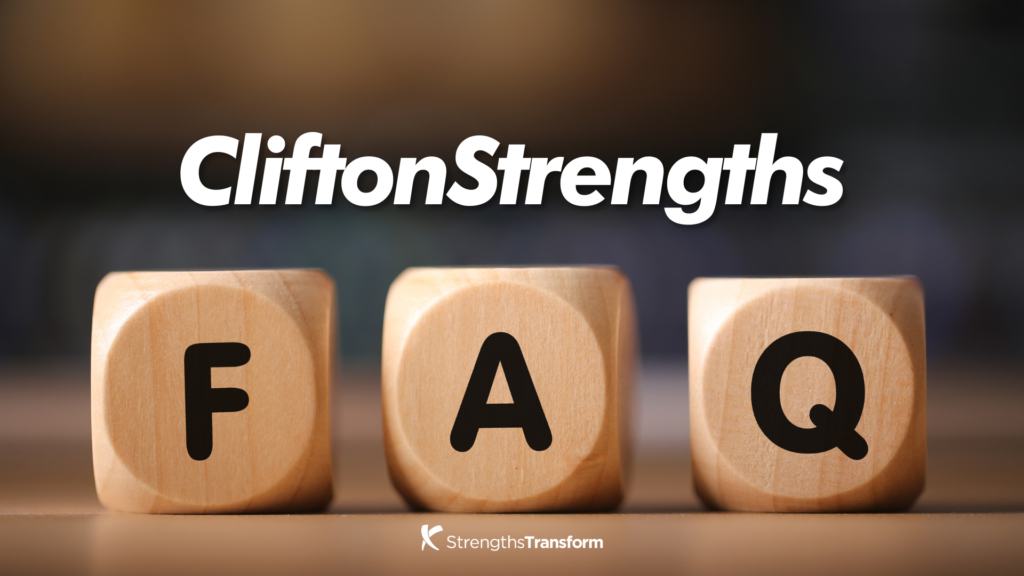FAQs – CliftonStrengths Frequently Asked Questions
What Is CliftonStrengths?
1. What is the purpose of the CliftonStrengths assessment?
The CliftonStrengths assessment was created by educational psychologist Donald Clifton to help individuals identify their natural talents and develop them into strengths. StrengthsTransform makes use of the profiling tool as a vehicle for self-discovery to achieve individual, team and organisational successes.
2. Is CliftonStrengths a personality test?
CliftonStrengths is a trait-based psychometric assessment that measures your unique talents – your natural ways of thinking, feeling, or behaving. With varied combinations of 34 talent themes, it seeks to provide an accurate depiction of what is right (strengths) in an individual.
On the other hand, type-based personality assessments (e.g., MBTI or DISC) are used to identify a certain collection of characteristics that make up a broad, general personality classification.
All in all, a trait-based tool provides an accurate prediction of one’s thinking and feeling and is a useful deep-dive for self & social awareness.
3. What is the difference between CliftonStrengths and StrengthsFinder?
CliftonStrengths is actually the same assessment as StrengthsFinder. There was a rebranding effort by Gallup in 2015, which resulted in the name change.
4. How much does it cost to take the CliftonStrengths test?
The cost (based on Gallup’s latest prices) for the profiling test is:
- CliftonStrengths Full 34: SGD$90 (or USD$59.99)
- CliftonStrengths Top 5: SGD$38 (or USD$24.99)
For full workshop/coaching costs, do write in to us at [email protected]
5. How long will it take for me to complete the test?
It will take approximately 45 minutes of uninterrupted time to complete all 200 questions. You will have a time limit of 20 seconds to answer each question.
Click here for step-by-step instructions on how to take the test.
How Do I Use My CliftonStrengths Results?
1. What should I do with my CliftonStrengths results?
Discovering your natural talents alone is not enough. We highly encourage you to invest in them — practice using them and add knowledge and skills to them. Here are 5 ways you could begin your Strengths Transformation journey.
2. How can I use CliftonStrengths for teambuilding?
StrengthsTransform offers teambuilding activities for departments and organisations to bond and apply their learning through gamified experiential learning.
3. How can the CliftonStrengths profile be used by managers for organisational development?
Managers can use CliftonStrengths to gain awareness of their team’s strengths and blindspots. By identifying optimal partnerships for collaboration, they can achieve clarity on how best to lead their teams, improve team synergy and maximise performance.
4. Can the CliftonStrengths profile be used for youths?
Yes, the CliftonStrengths assessment can be applied for youths in the following areas:
- Academics and Study Skills
- Student Leadership
- Personal Effectiveness
- Career Guidance
- Teambuilding
Find out more about strengths-based development programmes we offer for youths and students here.
Is My CliftonStrengths Results Accurate?
1. How reliable is my CliftonStrengths profile?
Gallup has abundant evidence that CliftonStrengths is reliable, with excellent test-retest reliability results (results and differences between an individual’s initial test, and then retest) of 0.73, within a six-month time period. A correlation of ‘1’ means you will get the exact same results every time you take the test.
2. Can my CliftonStrengths profile change?
Your CliftonStrengths profile is not likely to undergo drastic changes over time. In fact, the order of one’s talent themes has shown to be relatively stable among those who have taken the retest within a decade.
3. Can I retake my CliftonStrengths profiling test?
If you have taken the assessment within the last decade, you do not need to retake it as you might not see meaningful changes in your results.
However, based on Gallup’s recommendation, you are encouraged to retake the test if you:
- Were distracted while taking it
- Took it in a non-native language
- Took it in your early years and more than 10 years have passed (as you may interpret the questions differently now)



